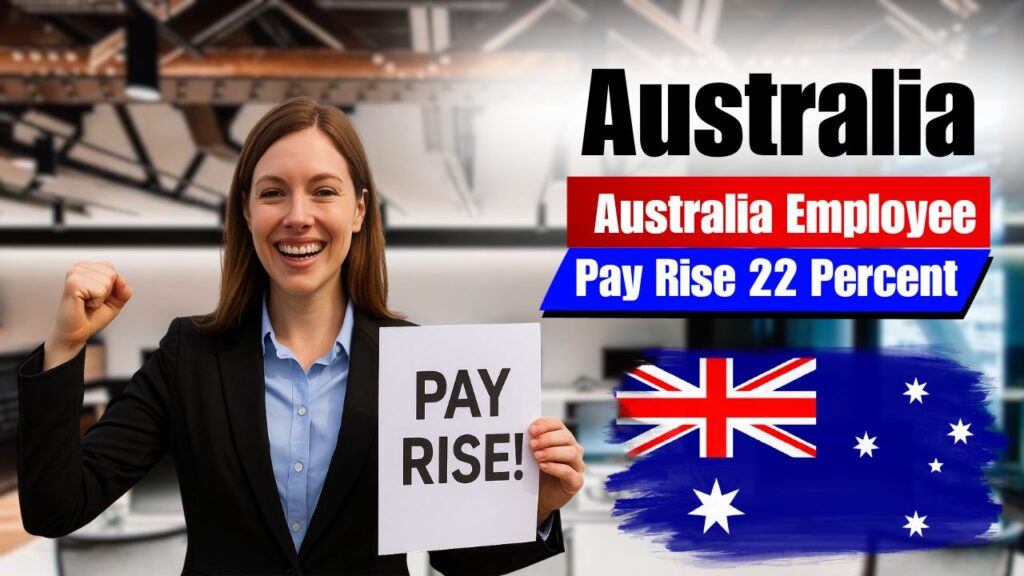Australia Approves Employee Pay Rise 2025 – Australia has recently approved a major 22% pay rise for employees, set to take effect from November 1st, 2025. This unprecedented wage increase has sparked celebrations across workplaces nationwide, promising a significant boost in disposable income for millions of Australian workers. The government’s decision comes amid growing calls for fair wages and reflects a strong commitment to improving living standards. Employers and employees alike are preparing for the upcoming changes, which are expected to positively impact household budgets, consumer spending, and overall economic growth in Australia.

Employee Pay Rise Impact on Australian Workers
The 22% pay increase will directly affect Australian employees across various sectors, from office professionals to frontline workers. Australian citizens are expected to experience enhanced financial stability, enabling them to better manage rising costs of living, rent, and daily expenses. This wage hike is one of the largest in recent years and reflects the government’s efforts to ensure fair compensation. Many workers are already planning adjustments to their household budgets, while employers are reviewing payroll systems to implement the new rates seamlessly. The increase is projected to elevate employee morale and productivity nationwide.
November 2025 Wage Boost for Australians
Starting from November 1st, 2025, the Australian workforce will officially receive their new salaries reflecting the 22% increase. Australians across multiple industries are expected to benefit immediately, particularly those in low- and mid-income brackets who will see a noticeable improvement in their monthly earnings. This adjustment not only helps households cope with inflation but also encourages greater consumer spending, stimulating economic growth. Industry experts suggest that this pay rise could lead to higher job satisfaction, reduced turnover rates, and a stronger sense of financial security among employees throughout Australia.
| Sector | Previous Average Salary | New Average Salary | Effective Date |
|---|---|---|---|
| Healthcare | $60,000 | $73,200 | Nov 1, 2025 |
| Education | $55,000 | $67,100 | Nov 1, 2025 |
| Retail | $45,000 | $54,900 | Nov 1, 2025 |
| Construction | $65,000 | $79,300 | Nov 1, 2025 |
| IT & Tech | $70,000 | $85,400 | Nov 1, 2025 |
How the Canberra Government Supports Employees
The Canberra government has actively promoted this pay increase as part of its broader strategy to support the Australian workforce. Government agencies have coordinated with businesses to ensure timely implementation, providing guidance on payroll updates, taxation adjustments, and compliance requirements. This structured approach minimizes confusion for employers and employees, ensuring that all workers receive their new pay without delays. By prioritizing employee welfare and financial security, the Canberra government aims to create a more equitable work environment, reinforcing Australia’s reputation for progressive labor policies and fair wage standards.
Financial Benefits for Full-Time Australian Staff
Full-time Australian staff members stand to gain substantially from the 22% wage hike, translating to higher monthly take-home pay and increased purchasing power. This increase will allow employees to save more for future expenses, invest in personal development, and enjoy a better standard of living. Experts predict that the boost in income will also positively affect local businesses, as employees are likely to spend more on goods and services. Overall, the pay rise reinforces the importance of fair compensation while contributing to the economic vitality of cities and communities across Australia.
Frequently Asked Questions (FAQs)
1. When will the 22% pay rise take effect?
The wage increase will start from November 1st, 2025, across all eligible sectors.
2. Who is eligible for this pay rise?
All full-time and part-time Australian employees in covered sectors are eligible.
3. How will the pay rise affect taxes?
Employees may see minor changes in taxation, with guidance provided by employers.
4. Will this increase apply to contract workers?
Contract workers’ eligibility depends on their specific agreements and industry standards.




